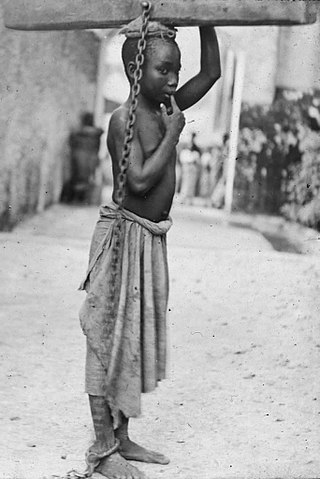
Slavery is the ownership of a person as property, especially in regards to their labor. Slavery typically involves compulsory work with the slave's location of work and residence dictated by the party that holds them in bondage. Enslavement is the placement of a person into slavery.

Abolitionism, or the abolitionist movement, is the movement to end slavery and liberate enslaved people around the world.

French West Africa was a federation of eight French colonial territories in West Africa: Mauritania, Senegal, French Sudan, French Guinea, Ivory Coast, Upper Volta, Dahomey and Niger. The federation existed from 1895 until 1958. Its capital was Saint-Louis, Senegal until 1902, and then Dakar until the federation's collapse in 1960.

Slavery in Canada includes historical practices of enslavement practiced by both the First Nations during the pre-Columbian era, and by colonists during the period of European colonization.

The Ewe people are a Gbe-speaking ethnic group. The largest population of Ewe people is in Ghana, and the second largest population is in Togo. They speak the Ewe language which belongs to the Gbe family of languages. They are related to other speakers of Gbe languages such as the Fon, Gen, Phla Phera, Gun, Maxi, and the Aja people of Togo, Benin and southwestern Nigeria.
Frederick Cooper is an American historian who specializes in colonialization, decolonialization, and African history. After finishing his BA at Stanford University in 1969, Cooper received his Doctor of Philosophy from Yale University in 1974. From 1974 to 1982 he was Assistant, then Associate Professor at Harvard University. Becoming Professor of History at the University of Michigan in 1982, he left for a professorship of history at New York University where he has worked since 2002.
Notsé is a town in the Plateaux Region of Togo. It is the capital of Haho Prefecture and is situated 95 km north of the capital Lomé. The town was formed around 1600 by the Ewe people, after they were displaced westward by the expansion of the Yoruba.

Illegal immigration is the migration of people into a country in violation of the immigration laws of that country or the continuous residence without the legal right to live in that country. Illegal immigration tends to be financially upward, from poorer to richer countries. Illegal residence in another country creates the risk of detention, deportation, and/or other sanctions.

The continent of Africa is one of the regions most rife with contemporary slavery. Slavery in Africa has a long history, within Africa since before historical records, but intensifying with the trans-Saharan and Indian Ocean slave trade and again with the trans-Atlantic slave trade; the demand for slaves created an entire series of kingdoms which existed in a state of perpetual warfare in order to generate the prisoners of war necessary for the lucrative export of slaves. These patterns persisted into the colonial period during the late 19th and early 20th century. Although the colonial authorities attempted to suppress slavery from about 1900, this had very limited success, and after decolonization, slavery continues in many parts of Africa despite being technically illegal.

The African Studies Association (ASA) is a US-based association of scholars, students, practitioners, and institutions with an interest in the continent of Africa. Founded in 1957, the ASA is the leading organization of African Studies in North America, with a global membership of approximately 2000. The association's headquarters are at Rutgers University in New Jersey. The ASA holds annual conferences and virtual events for its members year-round.
Kévé is a town and canton with 12,000 residents in southwest Togo.
Satvinder Singh Juss FRSA, is a British academic and professor. He is professor of law at King's College London and a barrister-at-law in Gray's Inn. He has published widely on the subjects of migration and international human rights law.

Siddharth Kara is a NY Times Bestselling author and a leading expert on modern-day slavery and human trafficking, child labor, and related human rights issues. He is a British Academy Global Professor and an associate professor at the University of Nottingham. He is best known for his book "Cobalt Red: How the Blood of the Congo Powers Our Lives" (2023). He has also published a trilogy on modern slavery: Sex Trafficking: Inside the Business of Modern Slavery (2009), Bonded Labor: Tackling the System of Slavery in South Asia (2012), and Modern Slavery: A Global Perspective (2017).
Migration studies is the academic study of human migration. Migration studies is an interdisciplinary field which draws on anthropology, prehistory, history, economics, law, sociology and postcolonial studies.
Prostitution in Togo is legal and commonplace. Related activities such as solicitation, living off the earnings of prostitution or procuring are prohibited. Punishment is up to 10 years imprisonment if minors or violence is involved.
La Presse Porto-Novienne was a French language weekly republican socialist newspaper published from Porto-Novo, Dahomey. The newspaper was founded in 1931 by Vincent Moreira Pinto. It carried subtitles in Yoruba language, and had a Yoruba language section.

Joanny Thévenoud was a French apostolic vicar of the White Fathers, best remembered for his missionary, ecclesiastical and public development work in Upper Volta.

Slavery has existed in various forms throughout the history of Nigeria, notably during the Atlantic slave trade and Trans-Saharan trade. Slavery is now illegal internationally and in Nigeria. However, legality is often overlooked with different pre-existing cultural traditions, which view certain actions differently. In Nigeria, certain traditions and religious practices have led to "the inevitable overlap between cultural, traditional, and religious practices as well as national legislation in many African states" which has had the power to exert extra-legal control over many lives resulting in modern-day slavery. The most common forms of modern slavery in Nigeria are human trafficking and child labor. Because modern slavery is difficult to recognize, it has been difficult to combat this practice despite international and national efforts.

The Nationality and Borders Act 2022 is an Act of the Parliament of the United Kingdom proposed in July 2021 relating to immigration, asylum and the UK's modern slavery response. The Act also deals with British overseas territories citizenship and registration of stateless citizens. Amongst other elements, it proposes to introduce "designated places" or "offshore" asylum hubs for application of refugee and migrant asylum claims, potentially in another European country or an African country. Part 5 of the Act grants the Government new powers to limit who is considered a victim of modern slavery, with clauses limiting support in cases where survivors have not complied with State-set deadlines to disclose their abuse. Under Part 5, decision makers would also be asked to consider the survivors' criminal history before deeming them eligible for support.

Togolese nationality law is regulated by the Constitution of Togo, as amended; the Togolese Nationality Code, and its revisions; the Code of Persons and Family; the Children's Code; and various international agreements to which the country is a signatory. These laws determine who is, or is eligible to be, a national of Togo. The legal means to acquire nationality, formal legal membership in a nation, differ from the domestic relationship of rights and obligations between a national and the nation, known as citizenship. Nationality describes the relationship of an individual to the state under international law, whereas citizenship is the domestic relationship of an individual within the nation. Togolese nationality is typically obtained under the principal of jus sanguinis, i.e. by birth in Togo or abroad to parents with Togolese nationality. It can be granted to persons with an affiliation to the country, or to a permanent resident who has lived in the country for a given period of time through naturalization.










